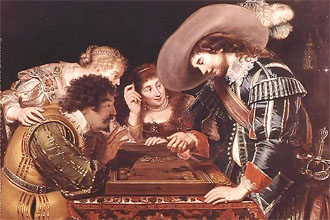|
| Magriel's NYT Columns |
 In the heat of battle a player may lose his nerve and fail to take a certain course of action — even though he knows it to be theoretically correct. Postponing a dangerous but necessary play will be likely to increase the overall risk. In such situations one should be guided by Macbeth’s admonition: “If it were done, when ‘tis done, then ‘twere well it were done quickly.”
In the heat of battle a player may lose his nerve and fail to take a certain course of action — even though he knows it to be theoretically correct. Postponing a dangerous but necessary play will be likely to increase the overall risk. In such situations one should be guided by Macbeth’s admonition: “If it were done, when ‘tis done, then ‘twere well it were done quickly.”
In the diagrammed position, taken from a recent contest at New York’s Game Room, Black has fortunately hit White in the bearoff and so averted a probable gammon. Black’s only problem now is to prevent White’s last man (on the bar) from coming home.
|
| Black to play 3-2. |
Black realized that in order to permanently contain White he must attempt a closeout by completing his home board. Indeed, if Black is able to make the 6-point, he will not only save the gammon but also win the game. He would then redouble, and White, despite having five men already borne off, must pass. The key question, then, is how can Black best make the vital 6-point.
One method is to attempt to make the 6-point naturally — that is, by amassing builders in the outfield and then waiting to roll the exact combination to form the point. Another method is by slotting — that is, placing a single exposed man on the 6-point with the hope that White will miss and Black will then be able to cover. The latter approach (slotting) is quick and direct, and ultimately the safest. The natural approach, though widely used, is actually more dangerous. Ordinarily, it would take at least four or five rolls, during which time White would have many opportunities to get a lucky shot.
Although Black realized the necessity for slotting, he was reluctant to do so at once. He feared that with only one direct cover number (2) for his exposed man on the 6-point, he might not be able to close the point immediately, and so have to endure more than one direct 6-shot by White. He decided to take a compromise course of action — he would delay slotting until he had additional ways to cover. Waiting to build up his courage to slot, he played 18/13.
|
|
|
Rollout
 Tom Keith 2013 |
|
Money play Black owns 2-cube Black rolls 3-2 1296 games with VR Checker play: 2-ply Cube play: 3-ply Red |
| 3-2: | Game | G | BG | Equity | ||||
| 1 | 21/18, 8/6 |
W L |
.5480 .4520 |
.0000 .2640 |
.0000 .0100 | +0.0810 |

| |
| 2 | 21/19, 18/15 |
W L |
.4949 .5051 |
.0000 .1582 |
.0000 .0035 | +0.0677 | (0.0133) | |
| 3 | 21/16 |
W L |
.4963 .5037 |
.0000 .1657 |
.0000 .0035 | +0.0633 | (0.0177) | |
| 4 | 21/19, 21/18 |
W L |
.4886 .5114 |
.0000 .1559 |
.0000 .0033 | +0.0601 | (0.0209) | |
| 5 | 18/13 |
W L |
.4830 .5170 |
.0000 .1549 |
.0000 .0036 | +0.0405 | (0.0405) | (a) |
| 6 | 18/15, 8/6 |
W L |
.5334 .4666 |
.0000 .2838 |
.0000 .0151 | +0.0216 | (0.0594) | (b) |

|
|

